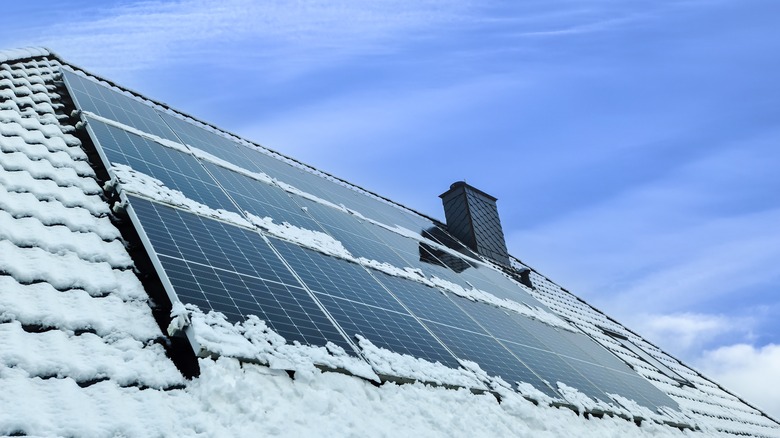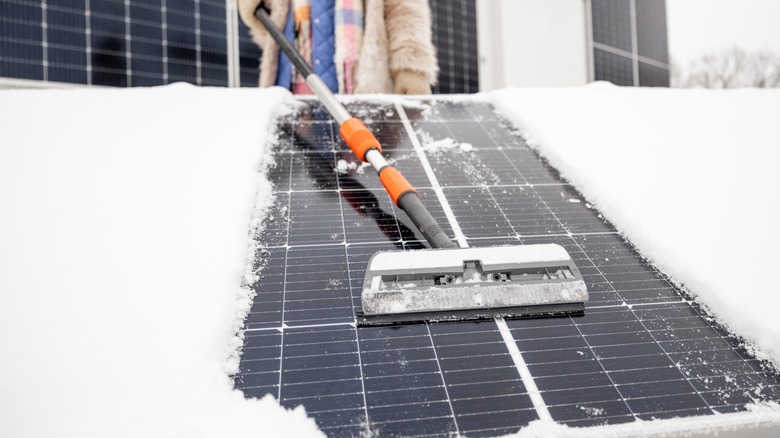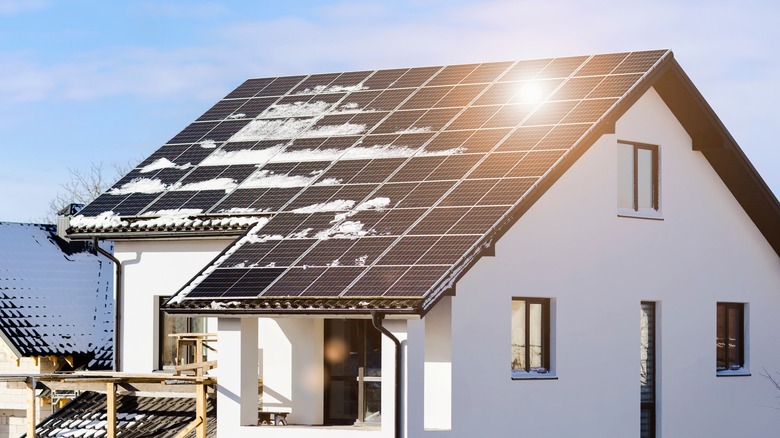Solar Panels In Winter: Will They Work With Snow On Them?
Owning solar panels seems offhand like a pursuit that can only be done in places that get minimal or no snow. After all, harnessing the sun's power is at the top of a solar panel's to-do list, and that can be difficult when there's a layer of snow as thick as an igloo covering it.
However, it's one of the common myths about solar panels that people living in areas with regular snowfall can't benefit from solar and save on energy costs. It's true that a solar panel won't function as well if it can't see the sun, but it's unlikely that enough snowfall will occur for that to happen. Plus, most panels are tilted at an angle so that snow can naturally slide off on its own, pushed along by the built up heat on the dark solar panels. Although that process could take a bit of time depending how cold it is, there are also solar panel snow rakes and brushes specifically designed to help remove the snow without damaging the panels. Moreover, solar panels are actually more efficient in colder temperatures.
There are lots of things you can do to improve the efficiency of your solar panels in snowfall, including making sure you choose the type of consumer solar panel that is right for you in the first place. For example, ground-mounted solar panels, might be better than roof-mounted panels in snowy places as maintenance is easier.
The snow is unlikely to damage the solar panels
Solar panel installation can be an expensive prospect and you might be tempted to rush to rake the snow off of them if you see it really coming down outside. However, it's unlikely that snowfall will damage your solar panels because most panels have undergone pressure tests and are designed to bear a certain amount of weight for extended periods of time. Plus, heavier snows will fall off on their own if your panels are installed at a tilt. Actually, snow could reduce the maintenance you have to do on your panels, as a light dusting could serve as a sort of natural cleaning mechanism.
In terms of efficiency, there's not much need to worry that snow will block your panels' ability to function. Sunlight will still penetrate a light dusting, and one study conducted by the Northern Alberta Institute of Technology found snow reduced solar panel efficiency by just 3%.
If you're still worried about your panels in a particularly heavy snowstorm, you can try looking up how much weight a solar panel will bear and compare that to the level of snowfall in the area. In most cases the panels will survive undamaged, assuming the snow isn't accompanied by hail.
Solar panels can actually be more efficient in winter
Even with the above concerns, it's worth noting that solar panels can often function more efficiently in winter months. Energy is created in a photovoltaic solar panel when the sun's light activates the electrons in the silicon panels, so overall energy absorption depends on the change in electrons at rest and in motion. According to Revision Energy, "In colder temperatures, electrons at rest have less energy, so when activated by the sun that difference is larger and the energy output is higher." White snow surrounding the panels can also improve photovoltaic performance by reflecting additional light.
In many places, winter snowfall is also limited to a few months, so even if snow stayed up there the entire time, your annual energy absorption will balance out in the summer. In general, in regions with lots of snow, days tend to be longer when summer does finally come around, so any losses in the winter will likely balance out with more sunlight in summer months.
There's little denying that snow on solar panels looks totally self-defeating, but a little melting, brushing, and waiting can go a long way in maximizing efficiency. You might actually get a better installation price in the winter as well because fewer people are getting it done due to the myth that solar panels don't work with snowfall. In a way, perhaps it's best to keep that myth alive after all.


